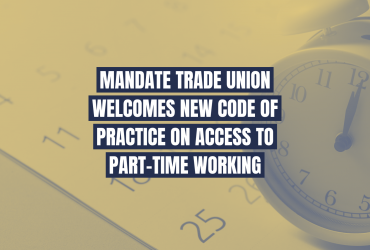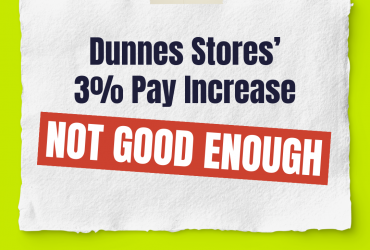It is time the workers’ movement was reborn
Friday 20 September 2013An opinion piece by Ronan Burtenshaw and Shane McNally on behalf of 1913 Unfinished Business
The recent commemorations of the 1913 Lockout have recognised a watershed moment in Irish trade unionism and celebrated the hard won rights which followed it. However, there has been little discussion of the erosion of the foundations that were laid down one hundred years ago – a serious problem for the trade union movement today.
The 1913 Lockout was brutal and ended in an short-term defeat. In early 1914 many workers went back to their jobs and broke ties with their unions. But this was a temporary setback. By 1920 the membership of the ITGWU had surpassed 120,000, more than four times what it had been in 1913.
The Lockout invigorated the Irish working-class and reminded them of their capacity to be an agent for change. It was a struggle of the people of Dublin against those who would take the power and wealth of the city into their own hands. And it was based on an understanding of the fundamentally incompatible interests of workers and their bosses in the workplace. The men and women in 1913 knew that if you divided a page between what bosses and workers wanted you would see that they were in conflict every hour of the day. Bosses want higher profits, we want higher wages. Bosses want to invest as little as possible, we want to improve the conditions we work in. Bosses want to limit the amount of paperwork they do, we want decent health and safety standards. This awareness was the fuel that propelled the trade union movement at the beginning of the 20th century to win the gains it did.
But it contrasts with today. How many people talk about the importance of class interests in determining the direction of society? Internationally there has been an unprecedented attack on workers in the last thirty years. Many have fought back: the miners in Britain and Spain, the automakers in France and America, the social movements that kicked the IMF out of Latin America in the early 2000s. But in Ireland the story is different. Our trade union movement sought refuge in social partnership – a system of agreements between bosses, unions and the government. Its proponents argue that it resembles ‘worker democracy’, because workers are permitted to sit at the top table. But in reality its effects have been to deepen the hold of the capitalist class on Irish society by weakening the institutions of the working-class. By mitigating conflict in the workplace it has robbed many workers of class consciousness, reduced trade unions to service-provision and disarmed many in the movement of the tools needed to fight and win.
And the results are evident: trade union density when the first social partnership agreement was signed in 1987 was 55%. Now, it is 31% – down 7% from the turn of the century. As austerity loads the burden of a crisis both practically and ideologically the making of bosses onto workers we in Ireland are probably in the weakest position of all austerity states in terms of fighting back. And this is because our history has been forgotten. The class struggle between workers and capitalists that led to hard-won gains, we’re told, should be consigned to the past – even as these gains are eroded on front of our eyes. Part of the problem is that those who do discuss class struggle too often do so in obscure or dogmatic ways, wrapped in academic theories rather than the experience of today’s workers. Those who want fighting trade unions must admit these failings. But if we examine what radicals like Connolly were talking about – a social conflict between workers who need their wages to survive and capitalists who own society’s wealth – who could deny their relevance to the world we live in today?
Take for example the situations that retail workers have faced with the demise of HMV, GAME and La Senza – occupying shops in search of justice like their forebears a century ago. Look at the soup kitchens in austerity Ireland. Or the emigration. Or the dole queues.
Capitalism is a system run for and by the rich. It says that workers will only get the essentials they need to live – like housing, food, clothes and employment – if someone, somewhere is making money from it. Social partnership has told us for a quarter of a century that workers can simply sit down at a table and negotiate with bosses under this system – that you don’t need to fight. This has weakened workers’ organisations and created a layer of professional negotiators who are the subject of suspicion for many working people.
We have seen in the mass strikes of fast food workers in the US and New Zealand an effort to forge a different path. Street-fighting trade unionism, built on organising at the grassroots level and aimed gaining fairer wages. These workers, many of whom are living below the poverty line and have families to support on atrociously low wages, are bringing the fight to the employers and developing a class consciousness in societies as devoid of it as ours.
Those movements have a lot in common with the tactics and form of New Unionism which emerged at the turn of the twentieth century. It superseded craft unions, which represented only a more secure section of the working-class, with unions that organised from below. This new wave challenged the ethos of existing worker organisations, developed a class consciousness through struggle and articulated a vision of a society run for and by workers.
Today there are many parallels with the situation faced by Jim Larkin, Rosie Hackett, James Connolly, Bill Haywood and the organised working-class they symbolised. Commemoration of their struggles are not enough. We must learn the lessons their actions teach. As British journalist Paul Mason said in a recent interview, “All over the world, there is a choice facing the existing organised labour movement – you cling to your bastions of what you currently hold, the halls, the old banners, commemorating old strikes of 20 years ago or you look at what Big Bill Haywood did 100 years ago and you rethink it.”
Workers are under attack and face uncertain circumstances. As capitalism shreds the public sector, with its secure jobs, we see in zero hour contracts and internship programmes the future of work. The way this crisis is resolved will dictate the development of the next phase of the system – and workers can expect persistent unemployment, low-pay, less security and reduced services. What we’re living through now is not a blip. It is the basis of the New Normal.
But that doesn’t have to be the case. Societies are shaped by struggle and we can fight back. Larkin’s New Unionism won amazing gains for the working-class in its time, and many other fighting workers’ movements have done the same.
This is because workers have more power than we are led to believe. We are the majority in this society. Forget ‘job creators’ – workers produce the wealth. They make society run. And with that comes strength. But this can only be tapped if we take trade unionism out of the negotiating rooms and back to the streets. And we need to get political – we need to talk about a society beyond capitalism, its super-rich and big businesses.
In short, trade unions must be the democratic and organic organisations of workers in their workplaces. And they must say: “workers should own and control their communities, workplaces and society.”
But can’t be divined from above, workers must get together to create it. One hundred years on from the Lockout we should heed the words of one of James Connolly’s favourite poets – Percy Bysshe Shelley:
“Rise like Lions after slumber
In unvanquishable number,
Shake your chains to earth like dew
Which in sleep had fallen on you –
Ye are many – they are few.”
It’s time for a rebirth of the workers movement. We have unfinished business.






